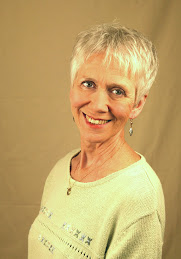My husband and I drove to Dewey, OK yesterday (about an hour and 40 minutes from Joplin) for my first intravenous vitamin C treatment at Dr. L. Scott Allison's clinic. I only received about half of the solution, however, because my vein was swelling abnormally, and Dr. Allison was concerned that I might be reacting to the corn from which the vitamin C was derived. I've never known of any corn allergy--I love corn, and have eaten a lot of it with no apparent allergic reactions. He decided to stop the drip and have me come back on Saturday for a different kind of vitamin C. I thought I was going to have the blood irradiation therapy yesterday, too, but he decided to wait on starting that as well.
I had been nauseous and feverish the previous night, possibly brought on by drinking a "whole-orange juice" to which I had added about 1/2 a grapefruit. Apparently the oils in orange skin have been shown to help kill cancer cells, so I've been juicing a whole orange with our centrifugal juicer and drinking the juice. I think adding the grapefruit did something to make it more potent. Since then we've found out that side effects to orange oil treatment include nausea, vomiting and diarrhea. (kind of like chemotherapy). I think the reaction was probably good for my immune system, even though it made me uncomfortable.
There are several web sites that tell about both intravenous vitamin C and blood irradiation. (Rather than listing them here, all you have to do is put "intravenous vitamin C" or "ultraviolet blood irradiation" in the search engine, and you'll find them.)
Here are some facts I've learned about the therapies:
Intravenous vitamin C:
You can't achieve the levels of vitamin C necessary to combat cancer through oral vitamin C; it must be added directly to the blood stream.
Cancer cells actively transport vitamin C into themselves, possibly because the molecular shape of vitamin C is remarkably similar to glucose, which cancer cells feed on. Whatever the reason, vitamin C accumulates in cancer cells. In unusually large concentrations, the antioxidant vitamin C starts behaving as a pro-oxidant as it interacts with intracellular copper and iron. This chemical interaction produces small amounts of hydrogen peroxide, which kills the cancer cells.
Dr. Riordan, from the Garvey clinic in Wichita, Kansas was the pioneer in this work. He was able to prove that vitamin C was selectively toxic to cancer cells if given intravenously.
Vitamin C also boosts immunity (as opposed to chemotherapy which destroys the immune system temporarily).
Ultraviolet Blood Irradiation
UVBI is a process where a quantity of blood (usually 125 ml) is drawn from the body and exposed to a particular wavelength of ultraviolet A light, for a duration of 10-30 minutes. The blood is then reintroduced back into the body.
The result of the treatment is that it stimulates the immune system and various enzyme systems to "learn" how to fight bacteria, viruses, and even cancer.
This approach has been used successfully for many different conditions, including cancer.
A book was written on the subject: Into The Light, by Dr. William Campbell Douglass, MD. (I haven't read this book yet. It can be ordered from Second Opinion Publishing, phone 1-800-728-2288.)
Apparently after an UVBI treatment, the patient feels a little tired and sleepy. (That's probably why Dr. Allison decided to wait for my treatment--I was already not feeling very well yesterday.)
Subscribe to:
Post Comments (Atom)

No comments:
Post a Comment